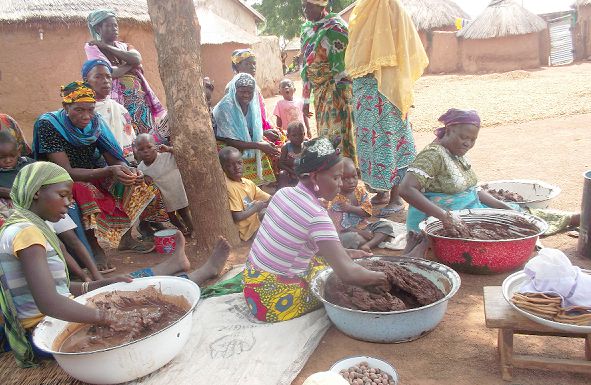
VRA starts implementation of the Pwalugu Multi-Purpose Dam
The Volta River Authority (VRA) has started the implementation of the Pwalugu Multi-Purpose Dam, which covers irrigation, hydropower and flood control.
This is to fulfil the commitment by His Excellency, the President, in the 2019 State of the Nation Address as well as the mandate of VRA to develop the hydropower resources of the Volta Basin.
Advertisement
While the project intends to fulfil the government’s policy of providing electricity to the people of northern Ghana, it also aims at achieving one of the key VRA objectives of providing leadership in climate change to ensure development in a sustainable manner.
Background
VRA started work on the Pwalugu Dam as far as the early nineties when it conducted prefeasibility studies on potential hydro sites in the White, Black and Oti River Basins.
The current project activities started in 2013 when VRA, with financial support from the Agence Francaise de Development of France and technical support from the World Bank, initiated a feasibility study as well as an Environmental and Social Impact Assessment (ESIA) for the construction of a Multi-Purpose Dam and Irrigation Scheme.
VRA completed the feasibility study in 2018 and has proceeded to the implementation phase of the project.
Project Description
The primary components of the Project are:
• A dam with an elevation of 165m near the Pwalugu Bridge on the White Volta River and with a maximum reservoir area of 350 km2.
• A powerhouse consisting of two turbines with 60MW of installed capacity and 16.5 MW of firm continuous capacity.
• An Irrigation Scheme consisting of a 12m high weir and canal network (main, primary, secondary and tertiary canals) for 20,000ha of land.
• A 15km overhead line for export of power to an existing transmission line.
The Project area is located on the White Volta River in Ghana, about 16km east of Pwalugu Bridge on the main Tamale-Bolgatanga road. The White Volta River at the dam site is the boundary between the Upper East Region and the North East Region.
The coordinated operation of the Pwalugu Dam with the Bagré Dam upstream on the White Volta River in Burkina Faso and with the Akosombo and Kpong dams downstream on the White Volta River is essential for river basin management.
The dam will be a central roller compacted concrete combined and earth and rock fill dam on the banks.
Project Benefits
The project benefits cover irrigation, fisheries, power generation and flood control as explained below:
1. The key benefit of the 20,000-hectare Irrigation Scheme will be the largest in the country. The scheme will boost economic activity in the Upper East and North East regions, as it will enhance the productivity of farming and attract large-scale commercial farms supported by about 15,000 out grower farmers.
The project has the potential to increase annual rice production in the country by up 117,000 tons and maize by up to 49,000 tons, reducing imports of these grains by 16% and 32% respectively. This will save foreign exchange as well as stabilise prices of these commodities on the local market.
Other crops that will benefit from increased production include onion, tomatoes, sweet potato, sweet pepper and watermelon.
The scheme will also form the nucleus of an agro industry to process the output of the farms. This scheme will support Government’s policy of Planting for Food and Jobs as well as the One-District One-Factory initiative. Other potential benefits include development of aquaculture and fisheries.
2. The hydropower component will increase Ghana’s renewable energy capacity and contribute to meeting Ghana’s commitments under the United Nations Framework for Climate Change (UNFCC).
Ghana’s target is to achieve 10% renewable by 2030, from the less than 2% today. The project will also, have a solar component with the solar energy complementing hydro energy to enhance reliability of supply.
The electricity infrastructure created by the project will also provide access to electricity in the northern part of Ghana and enhance the reliability of power supplied to the Northern Electricity Distribution Company (NEDCo).
The Government’s target is to increase electricity access to 90% in the entire Northern Ghana, from 60% in the Upper East Region and 70% in the Northern, North East and Savanah Regions combined.
3. The dam will also provide protection from the perennial floods that occur in the White Volta basin during the rainy season. It will also help manage spillage of water from the Bagre dam.
This will reduce the regular damage to property and enhance income security. In 2018, floods in the area affected 52,000 people and led to 34 deaths and 2 people missing. Farms and properties were also, destroyed.
Project Impacts
VRA is revising the Environmental and Social Impact Study (ESIA) study, to take account of the reduction in dam elevation from 170m to 165m to identify the precise nature of project impacts, including the number of households or people the project will affect.
VRA is also preparing Resettlement Action Plan in accordance with established international standards to ensure that it adequately compensates or resettles all persons adversely affected by the project.
Resettlement will also take due cognizance of any cultural or social considerations. VRA started extensive stakeholder consultation in 2014 to ensure that it takes account of concerns of the affected persons in the design of the project.
The objective is to ensure that all affected persons end up better off than they were before the project.
Project Implementation
Government has earmarked funds from the People’s Republic of China for the project. The plan is therefore to award a contract by the end of the year for construction to begin.
The construction of the dam will take about three and half years.
VRA has engaged a team of international consultants to complement its extensive experience in the management of hydropower dams to ensure the contractors build and implement the project to the highest engineering standards.




